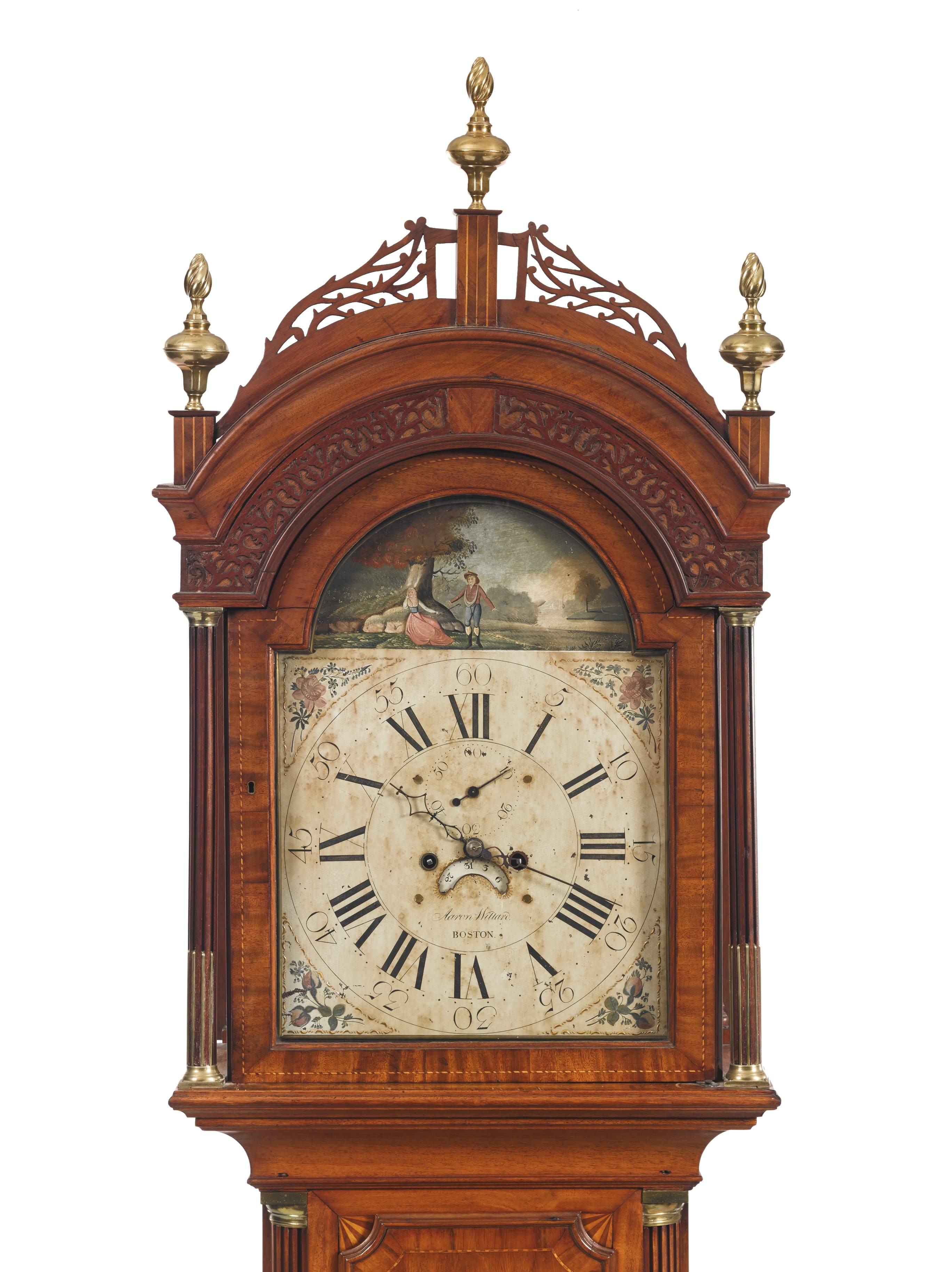
Free Virtual Lecture Series — Tempus Fugit/Time Flies: Measuring, Perceiving, and Living Time in Early America (Registration Closed)
January 26, 2025, 2:00 pm - April 27, 2025, 3:00 pm
Category: Lectures
These virtual events are only on Zoom! Registration closed.
The 2025 Winter Lecture Series will take place on Zoom from 2–3 p.m. (ET) on the following Sundays: January 26, February 23, March 30, April 27.
Lectures are free, but registration is required.
Early New Englanders frequently invoked the passage of time in religious terms, but the “horological revolution” of the seventeenth and eighteenth centuries produced technological developments in timepieces that complemented older cultural views of time. These developments went on to play an important role in the standardization of timekeeping, the rise of market economies, and industrialization. Sundials, mechanical clocks, and pocket watches were not only scientific marvels but also style-bearing objects that displayed refinement. Such objects provide suggestive windows into everyday life, especially when we broaden our sense of the many different objects and practices that marked the passage of time for diverse early Americans. This series features speakers who will address both the abstract and material nature of time found not only in clocks but also in other objects and processes central to life in early New England such as brewing, needlework, husbandry, farming, and cooking. Together the presentations will complicate our sense of what the passage of time meant for early New Englanders who had more than one way to “keep” and “spend” time. All lectures are free of charge and will be presented virtually via Zoom webinar.
Sunday, January 26, 2–3 p.m.
Bob Frishman, Horology professional and scholar
Lecture: “Edward Duffield and Colonial American Clockmaking”
Bob Frishman has professionally repaired nearly 8,000 timepieces and sold more than 1,700 vintage clocks and watches. In recent years, he has reduced his clock-repair activities and now devotes his time to research, writing, travel, lecturing, and conference planning. He organized ground-breaking horology-related conferences at the Winterthur Museum, the Museum of Fine Arts, Boston, the Henry Ford Museum, the Museum of the American Revolution, the Horological Society of New York, and he was an organizer of the 2019 “Time Made in Germany” international symposium in Nuremberg. As a scholar of horology, and assisted by a personal library of 900 books on the subject, he has published more than 100 articles and reviews in Maine Antique Digest, Watch & Clock Bulletin, and elsewhere. His recent book on the Philadelphia clockmaker Edward Duffield was published by the American Philosophical Society Press in 2024.
Sunday, February 23, 2–3 p.m.
Alexandra M. Macdonald, Ph.D, SSHRC Postdoctoral Fellow at Brock University
Lecture: “‘Regard not time, but this sign’: Recipes and Embodied Knowledge in Early America”
Alexandra M. Macdonald is an historian of labour and the body with a particular interest in embodied knowledge and practices of making in the Atlantic world in the eighteenth century. As part of her research, she is interested in using period specific ingredients and methods to recreate historical craft and culinary recipes, for example indigo vats and preserved food. Alexandra has received a number of fellowships to support her research, including a fellowship from the New England Regional Fellowship Consortium which brought her to Deerfield. Most recently she was a Postdoctoral Fellow at Winterthur Museum, Garden & Library where she worked closely with conservation scientists to analyze a canvaswork embroidery made in Connecticut in the mid-eighteenth century. She is currently the Social Science and Humanities Research Council Postdoctoral Fellow at Brock University where she is working on her second project, a book length study of indigo in the Atlantic world.
Sunday, March 30, 2–3 p.m.
Sara J. Schechner, Ph.D, David P. Wheatland Curator Emerita of the Collection of Historical Scientific Instruments, Harvard University
Lecture: “Marking Time during the American Revolutionary Period: Sundials and Clocks”
Sara J. Schechner, Ph.D is Curator Emerita of the Collection of Historical Scientific Instruments at Harvard University, retiring in 2024 after a quarter century of service. She remains active in international societies related to historic preservation and history of science. She is the author of Time of Our Lives: Sundials of the Adler Planetarium (2019), co-author of Tangible Things: Making History through Objects (2015), author of Time and Time Again: How Science and Culture Shape the Past, Present, and Future (2014), and co-editor of Forty Years of Scientific Instrument Studies (forthcoming 2025). Her next book will be Creating an Ordered World in Disordered Times: The Pope Orrery. It analyzes a grand orrery (a mechanical model of the solar system) made in Boston during the American Revolution and what it reveals about life and work in those times.
Sunday, April 27, 2–3 p.m.
Elizabeth Bacon Eager, Ph.D, Assistant Professor at Meadows School of the Arts, Southern Methodist University
Lecture: “Mastering Time: Slavery, Self-Sovereignty, and the Eighteenth-Century Clockmaker”
Elizabeth Bacon Eager is an assistant professor of art history at Southern Methodist University, where she teaches courses on early American art, architecture, and material culture. Exploring intersections between art, science, and technology of the eighteenth- and nineteenth-century Atlantic World, Dr. Eager is particularly interested in questions of materiality and process and fascinated by the reconstruction of historical tools and techniques. Her current research examines the material culture of time in early America, with a particular focus on objects and images produced by Black, Indigenous, and female makers. Dr. Eager’s work has been published in The Art Bulletin, Journal18, and Panorama: Journal of the Association of Historians of American Art and her research supported by the Huntington Library, Museum & Gardens, the McNeil Center for Early American Studies, the ACLS/Luce Foundation, and the American Antiquarian Society.
